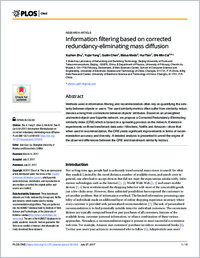Information filtering based on corrected redundancy-eliminating mass diffusion
- Zhu, Xuzhen State Key Laboratory of Networking Technology, Beijing University of Posts and Telecommunications, Beijing, China
- Yang, Yujie State Key Laboratory of Networking Technology, Beijing University of Posts and Telecommunications, Beijing, China
- Chen, Guilin State Key Laboratory of Networking Technology, Beijing University of Posts and Telecommunications, Beijing, China
- Medo, Matúš Department of Physics, University of Fribourg, Switzerland
- Tian, Hui State Key Laboratory of Networking Technology, Beijing University of Posts and Telecommunications, Beijing, China
- Cai, Shi-Min Web Sciences Center, University of Electronic Science and Technology, Chengdu, China - Big Data Research Center, University of Electronic Science and Technology, Chengdu, China
-
27.07.2017
Published in:
- PLOS ONE. - 2017, vol. 12, no. 7, p. e0181402
English
Methods used in information filtering and recommendation often rely on quantifying the similarity between objects or users. The used similarity metrics often suffer from similarity redundancies arising from correlations between objects’ attributes. Based on an unweighted undirected object-user bipartite network, we propose a Corrected Redundancy-Eliminating similarity index (CRE) which is based on a spreading process on the network. Extensive experiments on three benchmark data sets— Movilens, Netflix and Amazon—show that when used in recommendation, the CRE yields significant improvements in terms of recommendation accuracy and diversity. A detailed analysis is presented to unveil the origins of the observed differences between the CRE and mainstream similarity indices.
- Faculty
- Faculté des sciences et de médecine
- Department
- Département de Physique
- Language
-
- English
- Classification
- Physics
- License
-
License undefined
- Identifiers
-
- RERO DOC 305775
- DOI 10.1371/journal.pone.0181402
- Persistent URL
- https://folia.unifr.ch/unifr/documents/306015
Statistics
Document views: 119
File downloads:
- pdf: 138
